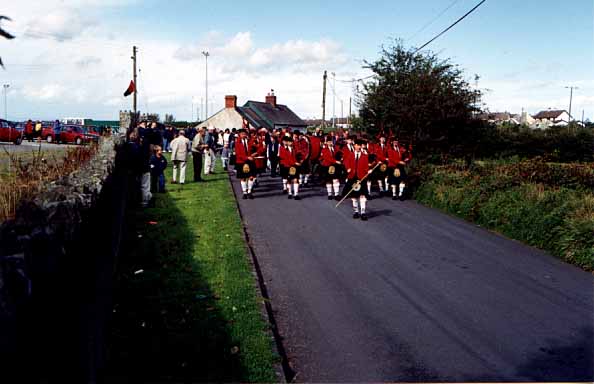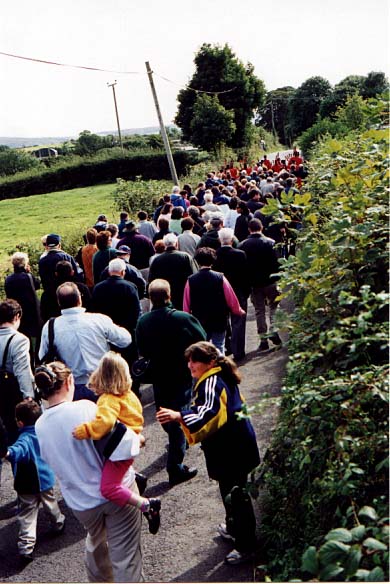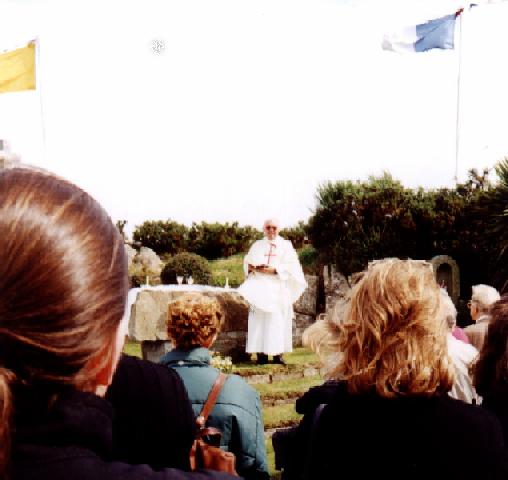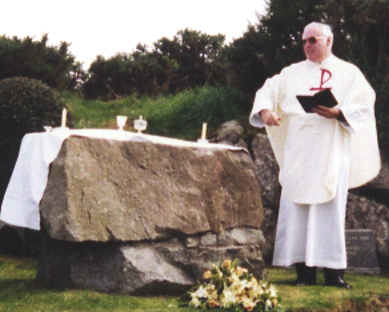
Joseph Mary Plunkett
This time, as was the case in '94, the service was ecumenical, and the many different faiths of Clan Mhac an t'Saoir were represented.
Family members gathered at the GAA Hall, on Ballyholland
Road. From there we followed the Thomas Davis Memorial Pipe
Band (in their bright red tunics and dark green kilts), along the
winding road up to Mass Rock.

The band played all the way up, and all the way back, and
at a certain point during the service they played "Amazing Grace."
They were flawless!

Before the service, people submitted the names of our cousins around the world who could not be with us, for various reasons. Some had passed away, others were too ill to attend, and some were struggling with various problems which made coming impossible. Their names were written on sheets of paper which were placed on the altar (Mass Rock), and the entire congregation joined in offering up a prayer for them.
(If there's a bit of a tilt in this picture, it's because
the photographer was in the process of falling off a stone wall
when the shutter released. He recovered, and is doing well.)

photo by James McAteer
Mass was celebrated by The Very Reverend Canon Hamill, and you can see him in front of the alter, which in this case is the historic Mass Rock.
It was a beautiful and moving service. A choir was picked on the spot. People were snatched from the line coming into the field, and you know, they sang like angels! During his homily, Canon Hamill made reference to the significance of the occasion for the Clan, and added that it was a special occasion for him too, as he was new to the area and this was the first time he had felt that he was "standing at the centre of the world."
Now, the Canon is a gentleman of considerable Irish charm and humour, to be
sure, and when he said that, a chuckle ran through the congregation. It was
only later, in discussing the service with others that we began to realize how
accurate the Canon's words had been. Indeed, many who were there commented
that they had experienced the same feeling - a profound sense of connection,
of being very near the heart of the world.

photo by Pat Zalinski
Let me tell you a wee bit about Mass Rock itself. During the Penal Times (when Ireland was under British marshal law), it was forbidden to celebrate Mass, on pain of death. Mass Rock is in a hollow, at the top of a hill, where it is completely hidden from view. Back then, a priest would arrive on foot, and in disguise, and he would wait up there, for his flock to arrive. People would sneak up the hill through the forest, one at a time. When all expected had arrived, lookouts would be posted and Mass would be celebrated.
Mass Rock you see, is the alter of an outdoor church, and although it has no walls or windows, it is a real, bona fide church. There it has stood for hundreds of years, at the very heart of Clan Mhac country, surrounded by McAteer farms. Today Clan Mhac represents most of the world's major faiths, and ethnicities, and there they stood hundreds deep, come from the Orient, Oceania, Europe, North Africa, the Americas, from all over Ireland and the British Isles, joined together as one, in worship.
Homepage;
top of page.
**************************************************************************
"But wherever Irish survives as a living tongue, old men kindle at the mention of Fionn and Oscar and Diarmaid and Goll, and at the slightest provocation will begin upon the long tales which the fond folk-memory still preserves.
Some years ago I was wandering idly one day along a road upon an island which lies three miles out into the Atlantic beyond the most westerly point of Ireland. The island is entirely Irish in speech, and the older inhabitants still preserve a rich treasure of song and story. As I strolled along I heard a call from the next field, and clambering over the wall, I found myself in the presence of an old man of over eighty years, who yet retained something of the strength and happy spirit of his youth.
As I came up he spoke: 'You have an unsociable way with you (Tá cuma fhiadhain ort). Don't you give folk a greeting when you go by them on the road?' 'Yes,' I said, 'I greet people, but I didn't see you over the wall.' 'A man should have his eyes in every corner' he said. 'but sit down now and we'll have a crack together.'
He had been digging potatoes in a furrow in the field, and he now laid the potato spade cross-wise over the furrow, and sitting down on one end, courteously signed to me to take my place on the other end. I did so , and without further preamble or explanation, he fell to reciting Ossianic lays. For half an hour I sat there while his firm voice went steadily on. After a little while he changed from poetry to prose, and began to recite a long tale of Fionn and his companions and their adventures throughout the world; how they came to Greece and what strange things befell them there. At times the voice would alter and quicken, the eyes would brighten, as with a speed you would have thought beyond the compass of human breath he delivered those highly artificial passages describing a fight or a putting to sea, full of strange words and alliterating rhetorical phrases which, from the traditional hurried manner of narration, are known as 'runs.'
At the end of one of these he would check a moment, with triumph in his eye, draw a deep breath, and embark once more on the level course of his recitation.
I listened spellbound and, as I listened, it came to me suddenly that there on the last inhabited piece of European land, looking out to the Atlantic horizon, I was hearing the oldest living tradition in the British Isles. So far as the record goes, this matter in one form or another is older than the Anglo-Saxon Beowulf, and yet lives upon the lips of the peasantry, a real and vivid experience, while except to a few painful scholars, Beowulf has long passed out of memory. To-morrow this too will be dead, and the world will be the poorer when the last shade of that which once was great has passed away.
The voice ceased and I awoke out of my reverie as the old man said: 'I have kept you from your dinner with my tales of the fiana .'
'You have done well' I said, 'for a tale is better than food', and thanked him before we went our several ways".
Homepage;
top of page.
**************************************************************************
Young Thomas McAteer was born in Strabane, County Tyrone, in 1890. His mother died when he was only two. Children need a mother, so his dad remarried shortly thereafter. Thomas had only a year of school under his belt, when the day after his first communion, he was sent off by his stepmother to pick flax for the local linen company at Strabane. Times were hard and money was scarce, so if you wanted to eat regularly, you had to work. Thomas entered the workforce at the age of eight.
We become part of the linen industry
And follow its processes to the grubby town
Where fields are compacted into window-boxes
And there is little room among the big machines.
Michael Longley
One pay-day his mother missed her date at the pay office. Tom was a young man of fourteen then, and was not to miss his chance. He had already packed his worldly belongings (a comb and a toothbrush) in a handkerchief tied to a stick. He collected his wages and headed for the road, where he got a ride on a "jaunty cart", and then on a lorry. The lorry took him right down to the docks in Belfast. He reconnoitered long enough to figure out how to stow himself away on a ship, along with some food he had secured for the trip. He found a ship taking on cargo, and that meant she would probably cast off in the morning. Tom had no idea where she was bound, but he figured it would be better than where he had been, so he snuck on board and stowed himself away in a life-boat.
Two days out to sea, Tom had to go to the bathroom. He slipped out of his hiding place and began looking for the toilets. As luck would have it he was apprehended by a crewman, and was promptly marched before the captain.
The captain listened patiently to everyone's story, and then leaned back to think. The ship was well out to sea, and safely past any Irish ports. There would be no turning back. After a long silence he turned, and stared at the young stowaway. Thomas braced himself. Finally the captain spoke. "Well, young man", he said, "do you know what a gopher is?" Tom didn't know. "A gopher" declared the captain, "is someone who goes for this, and goes for that. Well, you are going to be my gopher."
On board ship, the captains word is law, and though we know very little about Thomas' adventures as ship's gopher, he doubtless did his best. As the ship steamed up the Gulf of St.Lawrence, the captain sent a wireless message off to the port of Montreal, explaining the situation, and requesting that the Hibernian Society be notified. When the ship docked at Montreal, a small welcoming committee from the Irish community was waiting, and Tom was taken off to begin his new life. He was placed with an Irish family who ran a rooming house in the Point St. Charles district of Montreal, and they found him a job at the Redpath Sugar refinery.
In 1914 the Great War broke out. Tom joined the "Royal Montreal Regiment" and was shipped off to fight in France. It was during the war that he had what would be his only opportunity to visit his family in Ireland. Not much is known about the visit, other than that it was during his leave from the front, and that it inspired his younger brother to enlist. Tom lost an eye in the Great War. His brother was killed somewhere in France.
After the war, he returned to Montreal. He moved back into "The Point" where there was a large Irish community, and it was at a Saturday night dance at Richmond Hall that he met a charming young Irish girl. She was only in Canada a few years herself, and worked as cook for a wealthy family in Westmount. The two were soon married, and set out to make a better life for themselves.
Tom wanted to become a stationary engineer, but he could not read or write, and he would have to pass a written examination to get into the field. His bride drew pictures of furnaces and boilers in a copy book, and labeled them, and taught her new husband to read enough that he could pass the provincial exams. Pass he did, and he soon had a new job with the canal authority. He worked on the Lachine Canal for the rest of his life, where he operated a floating derrick. Later on he and his wife bought a little house in The Point, and it was there that they raised their family.
The hours of reading about boilers, blowers, and pumps must have had some considerable effect on her, because the children remember their mother as someone who could fix anything. For instance, if the cord on her iron wore out, she would buy the parts and repair it herself.
The children remember their mother reading the paper aloud every night after supper. Thomas would be tired after a long day at work, and he would lie down on a couch in the kitchen to listen and relax. After a while, his eyes would close, and he would be very still. She would notice that he had drifted off, and she would stop reading. Then they would hear his voice ask "Is there no news tonight, Mammy?"
Thomas never got into writing letters, so his wife handled all the correspondence. She wrote letters home to his family as well as her own. Later on, as they became a bit more affluent, there was some spare money, and it was decided that a trip home to the old country was in order. Thomas had been back during the war, but his wife had never been back, and as there was only enough money for one person, they decided it was her turn to go. While there, she visited both her family and his. It was the only time she ever met her in-laws.
On a sunny Saturday afternoon in 1949, Thomas was preparing to leave his derrick for the day. The deck would become covered with grease, dirt, and debris during the day, and it could make for uncertain footing. A new crew was arriving Monday morning, and Thomas wanted clean decks for them. He sent his fireman ashore to find a new mop, and he went aft to fetch a bucket of water. He was never seen again. The fireman reported him missing, and the police were called. Divers found him the following Tuesday.
It may seem odd by today's standards, but it was not unusual that a
working man would not know how to swim in those days. Children put out to
work so early are unlikely to spend their summers at camp. Just to learn
to read and write was a fine thing, and to finish school was a luxury.
The family remained in "the Point" for many years after that, and they
came to avoid taking the nearest bridge, because it crosses the canal close
to where their father drowned. It is a painful memory, and they avoid
that bridge to this day.
**************************************************************************
of Erin |